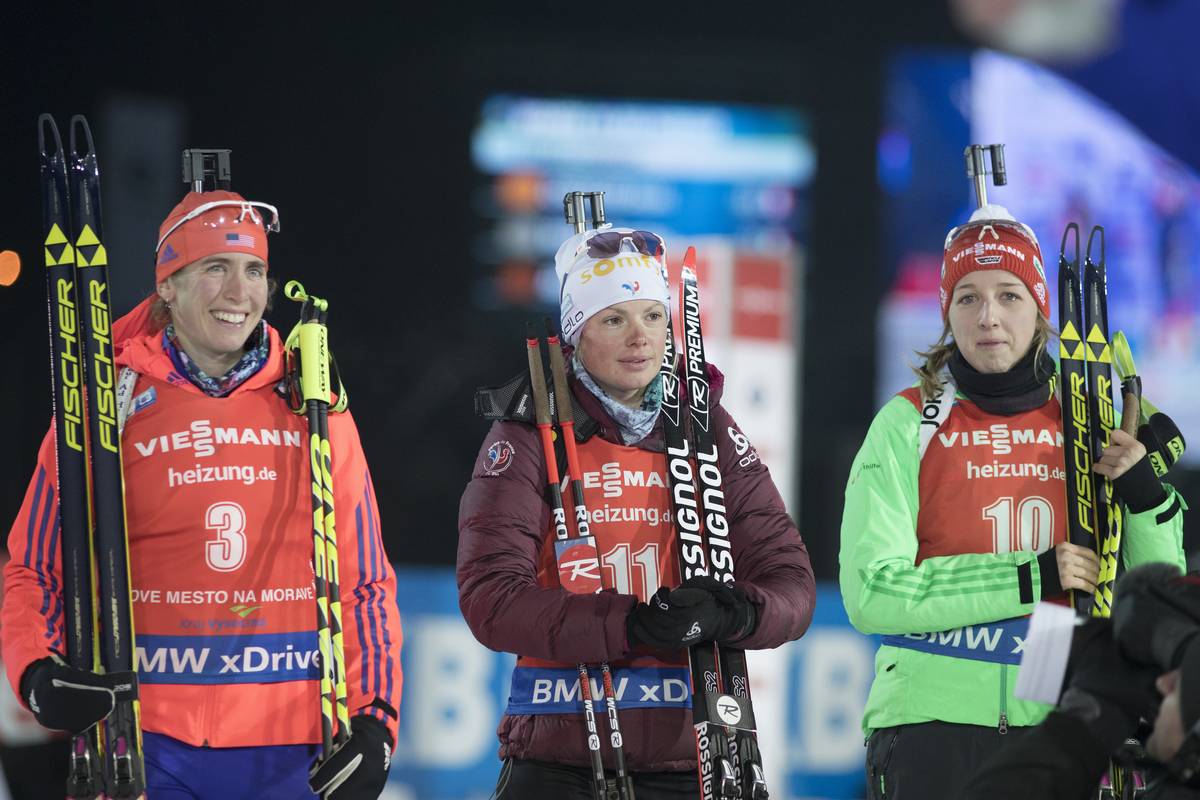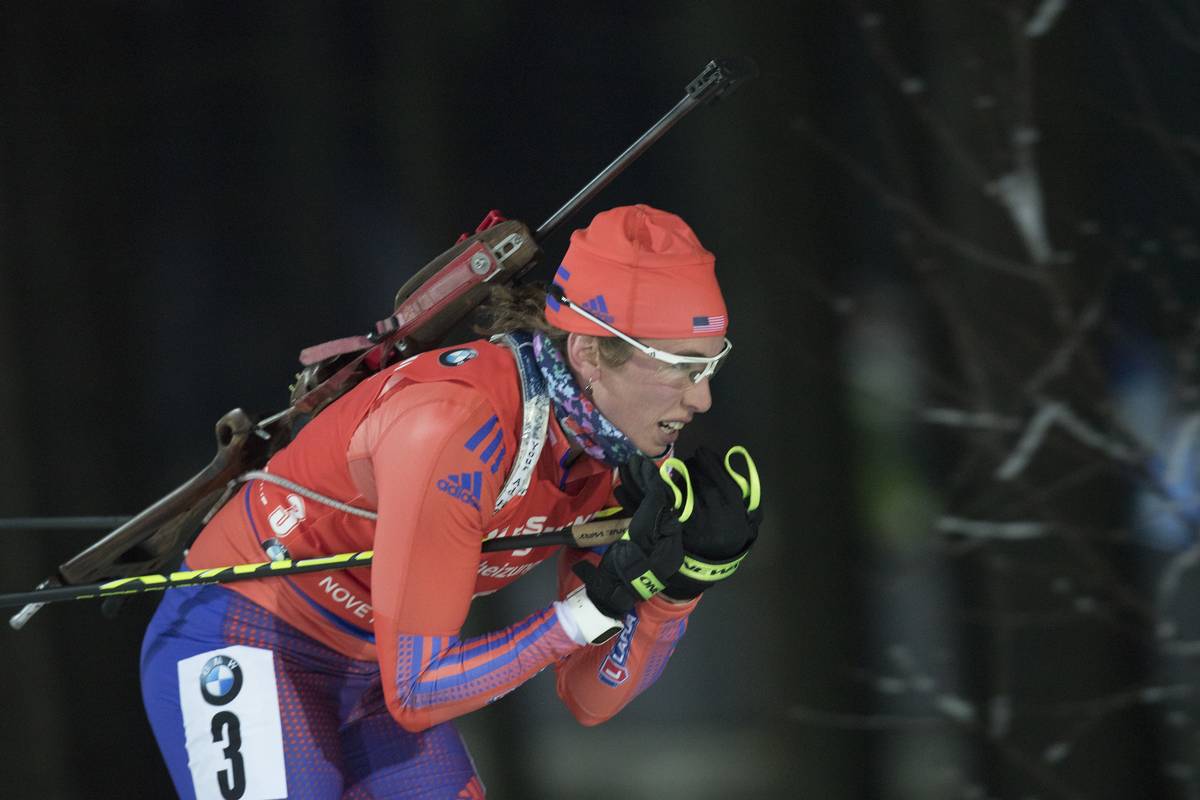
(Note: This article has been updated to include comments from Canada’s Julia Ransom.)
Beaming with excitement, France’s Anaïs Chevalier could barely believe her good fortune of this race weekend in Nove Mesto, Czech Republic, immediately following the first International Biathlon Union (IBU) World Cup podium of her career in Friday’s sprint with her first victory in the women’s 10-kilometer pursuit on Saturday. She crossed the line first in 30:38.1 minutes, after shooting just one penalty in the four shooting stages (1+0+0+0).
In the finish the 23-year-old biathlete cried tears of joy and covered her mouth with her hands in disbelief, as both teammates and competitors came up to congratulate her. With a strong skiing performance on the last lap, Chevalier held off Italy’s hard-charging Dorothea Wierer by 9.5 seconds. Wierer had moved up from seventh at the start, shooting two penalties but remaining clean in the final one that decided the race (0+1+1+0).
“It’s incredible. I’ve been crying until I got in here I think,” an emotional Chevalier later told reporters, according to an IBU press release.
“I was scared,” she recounted of trying to hold off Wierer on her last loop. “I was only enjoying the last final. It was crazy… I did not expect this [keeping all other athletes behind]. I was a little bit nervous on my first shooting, that’s why I missed one I think. But after that I only focused on my race, only on my job, and it worked.”

Behind Chevalier and Wierer, US Biathlon’s Susan Dunklee chased after Russia’s Tatiana Akimova on the final lap in an attempt to repeat her podium finish from Friday.
“I attacked hard on the first hill and I put some time into her,” Dunklee described in an email about the final loop. “[Akimova] started her attack on the second hill right about when my legs were flooded.”
Dunklee could not quite catch up to Friday’s sprint winner, Akimova, who took third (+19.4), and placed fourth (+28.0) with two penalties (0+1+1+0). As she finished, Dunklee happily waved to Nove Mesto’s crowd filling the stadium. The result was her best in a pursuit, and fourth-best overall.
“With two misses and my best effort on skis, I am very satisfied with my result today,” Dunklee wrote.
Akimova was also pleased with the outcome — her second-straight podium after having never landed a Wold Cup top 10 before this weekend.
“I am twice as surprised as I was yesterday, despite the place,” Akimova said via a translator during the press conference. “I am very, very happy right now … The coaches gave me information about my position, plus I saw Dorothea in front and was trying to keep up with her.”
“I was trying really hard to stay with Wierer and not to think about Dunklee behind me, but she was very fast, so I am happy I finished in third place,” Akimova said, according to an IBU press release.
***
In the first prone shooting stage of the pursuit, in front of some 35,000 roaring fans in the arena and lining the course, Dunklee shot clean while Akimova and Chevalier, who started just in front of her each missed a shot. That allowed Dunklee to take the lead on the next lap. Still, she did not yet think about her elusive first World Cup victory.
“That was still very early in the race and I knew a lot could happen,” Dunklee wrote. “I had to stay focused on one lap at a time. In some ways when skiing in the front it’s easy to stay relaxed and ski your own pace. You don’t see your competitors.”

In the second prone stage, Dunklee missed one and had to ski a penalty lap. Germany’s current World Cup leader Laura Dahlmeier took the lead with her second clean shooting, about 12 seconds ahead of Chevalier, with her teammate Franziska Preuß skiing in third.
But in the first standing stage, the lead switched again when Dahlmeier shot two penalties and Preuß one. In this standing shooting Dunklee also added another miss to her tally, and so the winners of the sprint Akimova and Chevalier who stayed clean were skiing in front again, with Wierer in third.
Chevalier entered the stadium about 10 seconds ahead of Akimova in the final shooting stage, already beginning to shoot quickly before her competitors had even reached the mat, and the French skier managed to stay calm again to clean every target. Wierer overtook Akimova by shooting much faster and on the final lap, she reduced her gap to Chevalier by half.
“It was good because I was only 23 seconds behind [starting the race] and not a minute and something like in the other [pursuit] races,” Wierer explained at the press conference. “So I knew I just had to do a good shooting. Normally I really like the pursuit. But I also knew there were a lot of strong girls. Today I felt really comfortable and really good on the skis.”
Asked about the conditions on the range with only two athletes shooting clean for all stages, Wierer added, “It was not so difficult today. But I had a little problem, I had a frozen finger, this one [moving her right trigger finger], so that is not so good for shooting.”
According to statements by multiple athletes, the conditions on the course in Nove Mesto were very difficult on Saturday. In the men’s pursuit Czech Republic’s Ondrej Moravec fell and broke his rifle stock in half. Some German athletes and wax technicians complained to broadcaster ARD that the tracks were prepared very icy and with so little snow in some sections that they ruined a few pairs of good skis.
“All corners were impossible to ski aggressively,” Dunklee wrote. “Too bad they don’t make race skis with metal edges.”
Ransom Ties Career-Best 19th
Starting out in 26th place after the sprint, Canadian Julia Ransom steadily moved up through the field with three clean shooting stages. She came into the final shooting with a good chance at a top-15 position, but then missed her final shot. She left the penalty lap still holding the place she had after the third shooting, 18th, but lost one place to Norwegian Marte Olsbu on the final lap to finish 19th (0+0+0+1, +1:48.5).
With this result Ransom tied her career best in a World Cup, with two more 19th-place finishes in a pursuit in Antholz, Italy, and in a sprint at her training grounds in Canmore, Alberta, both last season.
“I knew that I would have to have a very solid shooting day to move up with all the women ahead of me,” Ransom wrote in an email on Sunday. “And although happy with 19, missing my very last shot is incredibly annoying. The course definitely had icey sections on it that proved problematic for some while climbing. However I chose a new pair of skis that had better edges and was set through the ice patches!
“The fans here are incredible!” she added. “Every inch of the course was lined with spectators all dressed up and cheering loudly with noise makers and trumpets. Great energy here.”
Her teammate Rosanna Crawford improved by five positions from the sprint to finish 37th with two penalties (1+0+1+0, +2:51.8). It was the best result in an individual-start race of her season so far.
Dunklee’s teammate Joanne Reid placed 54th (+4:29), also shooting two penalties (1+0+1+0), losing two positions from her starting position. It was the second time Reid qualified for a World Cup pursuit, after a 47th place earlier this season in Östersund, Sweden.
Canada’s Megan Tandy finished 57th, falling back from a 44th place at the start due to five penalties including three in her final shooting stage (1+1+0+3, +5:32.7).
Mass Starts on Sunday
The IBU World Cup in Nove Mesto concludes with the first mass start races of the 2016/2017 season for the women and men on Sunday, for which the 25 best athletes in the overall World Cup standings plus five athletes not among those who had the best performances in the sprint and pursuit are qualified.
For the U.S., Dunklee will be at the start, while Ransom could be called up as a “Reserve Standby Athlete” as the next runner-up by the event results rankings.
For the men, Lowell Bailey (who placed ninth on Saturday in the men’s pursuit) will represent the U.S. with no other North American athlete qualified or on standby. (Stay tuned for men’s pursuit report.)
Results | Mass start provisional start list

Harald Zimmer
Harald has been following cross-country skiing and biathlon for some 20 years since the Olympic Winter Games in Albertville and Lillehammer. A graduate of Middlesex University London and Harvard University, he now lives near the Alps where he likes to go skiing, snowboarding and hiking. He is a former track athlete in middle-distance running, as well as a huge NBA fan.



